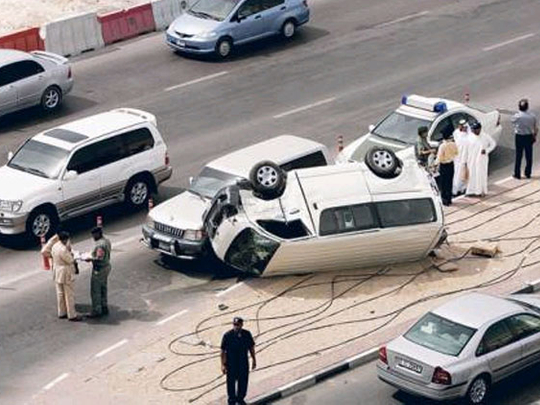
A spate of road crashes involving fatalities and serious injuries has raised concerns on driver behaviour and speeding in the UAE. The most recent example of reckless behaviour is from Umm Al Quwain where a motorist, driving on the wrong side of Sheikh Mohammed Bin Zayed Road, rammed his vehicle into another car coming from the opposite direction.
Three people, including two Emiratis and the motorists, died on the spot on Sunday. The driver was drunk and was speeding. Two days later, two buses collided in Abu Dhabi, killing three Asian expats and injuring two others. Police said the driver of one bus was not paying attention when the crash happened on Saih Shuaib Road.
The only option left before authorities is to increase the cost of such behaviour by introducing punishments that involve not just grounding of vehicles but also include jail time for repeated offenders
These two crashes and many others took place at a time when traffic is thin and roads are relatively empty due to remote working during the pandemic. This reduced traffic, some experts warn, is encouraging motorists to speed and drive recklessly. While authorities are investigating the recent crashes, road safety experts caution that the severity of accidents on empty roads is higher due to speeding.
Breaking speed limits
Not surprisingly, this behaviour has prompted Abu Dhabi Police to remind drivers that breaking speed limit by over 60km per hour will invite Dh7,000 fine and other punitive actions. The emirate, where 25 crashes were blamed on speeding last year, seizes and auctions vehicles of violators in serious cases. In Sharjah too, police said 274 drivers were fined, including some who drove 80kph over the speed limit during National Sterilisation Programme. One driver, the police found, was speeding at 278kph.
These examples are a proof that heavy fines and strict punitive action are not an effective deterrent for a section of motorists. They speed, drive recklessly, cause accidents and continue break traffic laws. While a large majority of people demonstrate responsible road behaviour, there is one section that does the opposite — endangering the lives of others and their own. Their disregard for traffic laws and a casual approach towards punitive action threatens the safety of law abiding motorists.
The only option left before authorities is to increase the cost of such behaviour by introducing punishments that involve not just grounding of vehicles but also include jail time for repeated offenders. A court in Fujairah early this year sentenced two drivers to seven years in jail for speeding, reckless driving and posing grave risk to road users. This kind of punishment will set an example and go a long way in bringing order to the country’s roads.







